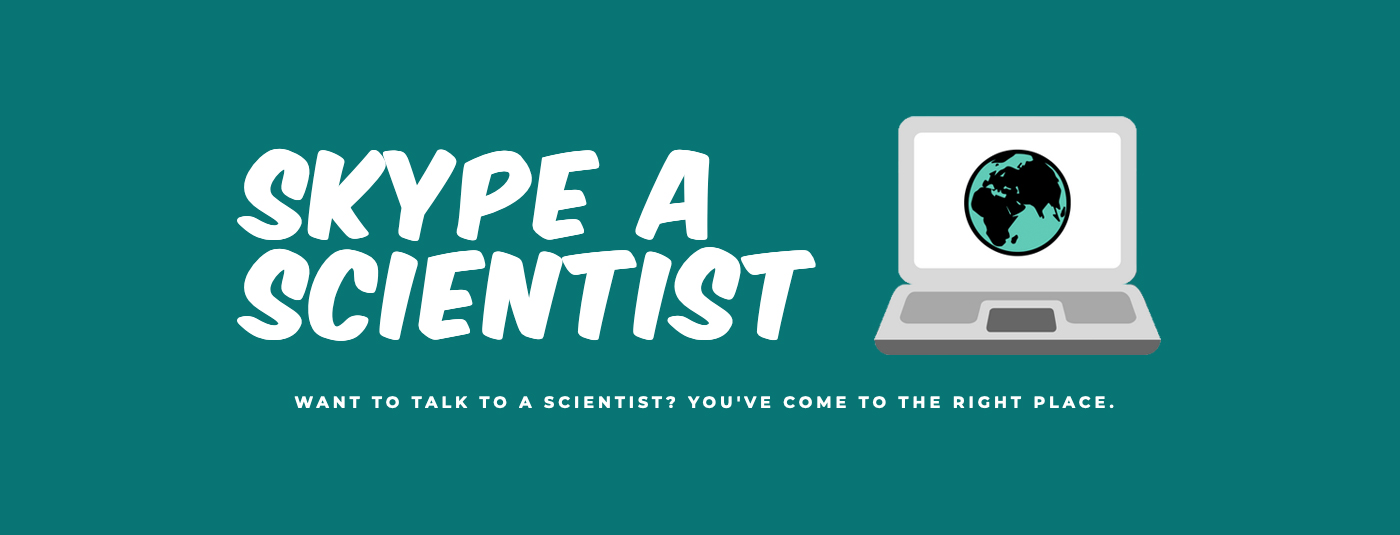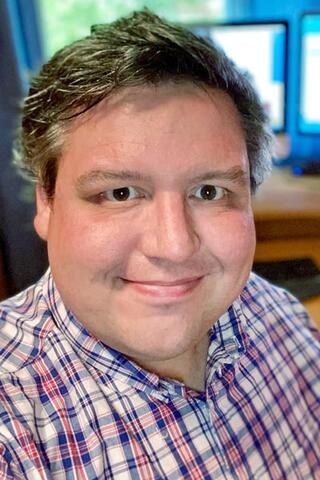
Researchers and staff from the Wisconsin Energy Institute (WEI) and the Great Lakes Bioenergy Research Center (GLBRC) are involved in many different outreach activities – from sharing about their science by participating in campus science festivals like Science Expeditions or MSU Science Fest to connecting with local community centers. The pandemic hasn’t slowed down Kevin Myers, a scientist in Tim Donohue’s lab in the Department of Bacteriology at the University of Wisconsin–Madison. Myers has been virtually visiting with students all over the country through the Skype a Scientist program, which gives classes and other groups the opportunity to talk with scientists. We sat down with him to hear his reflections on the experience.
What is Skype a Scientist?
Skype a Scientist is a way to connect classrooms with actual scientists. It's a nice way of putting a human face to what can seem like a kind of cold world of science. Students see that we're just people.

How did you get involved with the program?
I read about it somewhere on Twitter! I looked into it, and it looked really cool. I had previously done a few other outreach things, and I've given talks at my alma mater, University of Evansville. This sounded like a really interesting and really easy way to do outreach. It kind of dovetailed, for better or worse, with the pandemic where no one can travel.
What kinds of student groups have you Skyped with?
I've talked with students from early elementary—second or third grade as the youngest—up to high school. Most of the groups are in middle school or late-elementary. I also did a session with a juvenile facility of incarcerated kids in California. That was interesting for a lot of reasons. It’s a world I know nothing about. They were older kids and some of them were very, very interested in all the stuff that I had to say. That's usually how it goes: a subset of the group is super interested.
What happens before and during each session?
Beforehand, I send the teacher a link to the GLBRC website and to a Prezi overview of what we do at GLBRC. I encourage them to have some questions ready and to send them to me in advance, if possible, so that I can be prepared. You never know what kids are going to ask! Some of the questions are pretty adorable.
I'm not a very formal guy. I like to encourage the students to interrupt me and ask whatever off-the-wall questions they have. Last time, we went from talking about bioenergy to talking about Lyme disease and deer ticks to the COVID-19 vaccines. It's nice to figure out what the kids are super interested in. It's also important if they ask me something I don't know to say I don't know it. There's nothing wrong with not knowing something.
Can you share any memorable moments from your sessions?
The call with the incarcerated students was really interesting because there was one student who was really, really into it and asked a whole lot of questions—more about my background and how I do this than about the science. Being able to explain that I'm a first-generation college student, first-generation post-graduate student, I come from a really rural part of the country, and stuff like that—it was really nice to show that you can do this if you want to. Being a scientist is not out of your reach.
I do always show off my E. coli tattoo. That always comes up when they ask about my favorite bacteria. I got the tattoo after I defended my PhD. A lot of the kids can’t believe I have bacteria tattooed on me!
Do you encounter any assumptions or preconceptions about scientists?
Many kids’ conception of scientists is that we're all kind of stoic robots and don't have any passions. I'm a fairly animated guy, and I talk about things that I like to do, why I got into science, and how cool I think bacteria are. They’re always shocked when I tell them how amazing bacteria are, because they all know that bacteria are what make you sick.
What have you learned from your experiences with Skype a Scientist students?
What I've learned the most is that kids from all walks of life and all backgrounds are inherently curious. They love to just ask questions. The best classes I’ve had are the ones where the teachers let them ask questions, where the teachers encourage that. That's what I'm trying to instill in my own kid: never be afraid of being wrong. Just ask a question! The worst that’s going to happen is I'm going to correct you, and you're going to learn something. That's also the best thing that could happen: you're going to learn something.
I’ve also learned it's a different challenge to present science to third graders than to scientists. But kids are super interested and their little minds are curious. They want to learn. Giving people of all backgrounds and walks of life that that opportunity to learn is important.
How do you get started?
When you sign up, you indicate who you are and what fields you want to talk about. For example, I listed energy, microbiology, and computational biology. You can indicate how many matches you want, up to five at a time. After that, you can sign up for more. I started with one because I wasn't sure how it was going to work, and then this semester I did five or six. It’s a lot of fun.
What would you say to other WEI or GLBRC Members who might be interested in getting involved with Skype a Scientist?
Do it! Just start with one. Don't be intimidated. You know more than third graders about pretty much anything involved with science. And if not, maybe you'll learn something!
Part of why I like to do this is because I think, as scientists, we should all be ambassadors of science. We all have a certain responsibility to communicate scientific ideas and try to combat misinformation.
If you are interested at all in outreach—and I would encourage everyone to be interested in outreach—this is a very easy opportunity. You sit at your computer, you talk on Skype for an hour, and you're done! It's super low-pressure and the teachers are all very nice. They sign up for this too. They want you to come and talk to their students.
I can't recommend it highly enough for anyone who's even a little bit interested in science outreach. It's a great way to get started and get your feet wet.
Ready to get involved? WEI and GLBRC members at the graduate level and up can learn more about the Skype a Scientist Program and sign up here. Want to talk it over or need some support? Contact Allison at outreach@energy.wisc.edu. Remember to fill out the Outreach Tracker Form when you’ve done an outreach activity!